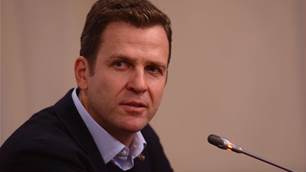Staging the world's mega sports events can bring financial pain as well as pleasure to the hosts.
Just ask the people of Montreal, the Canadian city that staged the 1976 Olympics and then spent the next 30 years paying off the debts, whether it was all worth it.
Things have moved on since then of course. Television contracts that were paltry then have now swung completely the other way so that they have become the single most important factor in funding World Cups and Olympic Games.
So while no one would argue that in feel-good, footballing, geo-political and historic terms, taking the World Cup to South Africa is a good thing, there is still a legitimate question about whether it is the right thing for the 25million South Africans - 50% of the population - that still live below the poverty line.
The South African government have spent around £2billion on 24 World Cup projects, the main ones being stadium development, transport improvements and security.
They argue that this is an investment, with the World Cup predicted to contribute around £5billion to the economy, create 415,000 jobs and attract 490,000 foreign tourists according to a 2008 report by consulting firm Grant Thornton.
That was before the global recession however, and now some critics, such as Chris Webb, a South African scholar and writer now based in Canada, say most South Africans will fail to benefit economically and will be unable to even afford to buy a ticket for a single match.
"For the 50% of South Africans living below the poverty line the tournament will not lead to better housing, healthcare or employment," says Webb.
Yet Grant Thornton's predictions may not be all that outlandish. After South Africa hosted the Rugby World Cup in 1995 they enjoyed a tremendous rise in tourist income, though part of that could also be put down to the country continuing to emerge from the shadow of apartheid.
Lee-Ann Bac of Grant Thornton says that without the World Cup, the effects of the recession would have struck the country far harder.
She said: "I would say that South Africa has come through the recession period probably better than we would have because of the World Cup, because people are employed and there's a focus on improving safety and security in this country.
"Excitement is becoming very high. Everybody's talking about it. They're talking about how this is the year for South Africa. This is the second-biggest thing that's ever happened to this country behind the 1994 democratic elections."
As far as FIFA are concerned, their revenue streams from South Africa prove that actually it is no longer where the World Cup is to be staged that has the key effect on their income.
The revenue budget for the 2007-2010 period, which is mainly based on the 2010 FIFA World Cup, amounts to £2.15billion, of which £1.3billion is attributable to TV rights and £815million to sponsorship and marketing rights.
One financial fact that has so far escaped any criticism is just how much the 32 teams will earn by playing in South Africa.
The total prize money has gone up by 60% from the 2006 World Cup to £400million.
The winner will receive £20million, the runner-up £16million, semi-finalists get £13million, quarter-finalists £12million, teams that reach the round of 16 £6million, and those eliminated in the group stage £5million.
Each of the 32 teams will also get £670,000 towards preparation costs and FIFA will distribute £27million via the national associations to the clubs whose players take part in the finals.
Things have moved on since then of course. Television contracts that were paltry then have now swung completely the other way so that they have become the single most important factor in funding World Cups and Olympic Games.
So while no one would argue that in feel-good, footballing, geo-political and historic terms, taking the World Cup to South Africa is a good thing, there is still a legitimate question about whether it is the right thing for the 25million South Africans - 50% of the population - that still live below the poverty line.
The South African government have spent around £2billion on 24 World Cup projects, the main ones being stadium development, transport improvements and security.
They argue that this is an investment, with the World Cup predicted to contribute around £5billion to the economy, create 415,000 jobs and attract 490,000 foreign tourists according to a 2008 report by consulting firm Grant Thornton.
That was before the global recession however, and now some critics, such as Chris Webb, a South African scholar and writer now based in Canada, say most South Africans will fail to benefit economically and will be unable to even afford to buy a ticket for a single match.
"For the 50% of South Africans living below the poverty line the tournament will not lead to better housing, healthcare or employment," says Webb.
Yet Grant Thornton's predictions may not be all that outlandish. After South Africa hosted the Rugby World Cup in 1995 they enjoyed a tremendous rise in tourist income, though part of that could also be put down to the country continuing to emerge from the shadow of apartheid.
Lee-Ann Bac of Grant Thornton says that without the World Cup, the effects of the recession would have struck the country far harder.
She said: "I would say that South Africa has come through the recession period probably better than we would have because of the World Cup, because people are employed and there's a focus on improving safety and security in this country.
"Excitement is becoming very high. Everybody's talking about it. They're talking about how this is the year for South Africa. This is the second-biggest thing that's ever happened to this country behind the 1994 democratic elections."
As far as FIFA are concerned, their revenue streams from South Africa prove that actually it is no longer where the World Cup is to be staged that has the key effect on their income.
The revenue budget for the 2007-2010 period, which is mainly based on the 2010 FIFA World Cup, amounts to £2.15billion, of which £1.3billion is attributable to TV rights and £815million to sponsorship and marketing rights.
One financial fact that has so far escaped any criticism is just how much the 32 teams will earn by playing in South Africa.
The total prize money has gone up by 60% from the 2006 World Cup to £400million.
The winner will receive £20million, the runner-up £16million, semi-finalists get £13million, quarter-finalists £12million, teams that reach the round of 16 £6million, and those eliminated in the group stage £5million.
Each of the 32 teams will also get £670,000 towards preparation costs and FIFA will distribute £27million via the national associations to the clubs whose players take part in the finals.
Copyright (c) Press Association
Related Articles

Spain versus Italy to go ahead

Germany preparing for World Cup success













